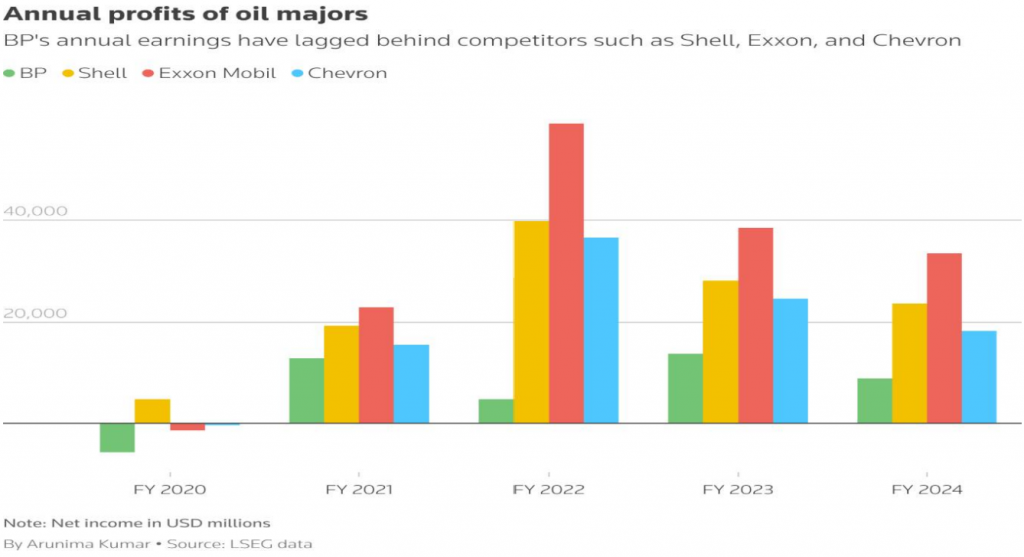BP’s “Fundamental Reset”: A Sign of the Energy Sector’s Broader Retreat from Renewables
BP has announced what it calls a “strategy fundamentally reset”, a dramatic shift that sees
the oil giant drop its green targets and refocus on oil and gas. This marks the first major
policy move under CEO Murray Auchincloss, undoing the work of his predecessor, Bernard
Looney, who had pledged to cut oil and gas output by 40% and significantly expand BP’s
renewable energy capacity.
As part of this shift, BP has abandoned its target to increase renewable energy capacity to
50 gigawatts (the equivalent amount of energy produced by 50 nuclear plants), a stark
reversal given that its current renewable capacity stands at just 8.3GW. The company
frames this reset as a move to drive improved performance, increase free cash flow, and
enhance long-term shareholder value.
This change of this magnitudes has been coming for some time considering BP’s poor recent
performances. An example is BP’s struggles with offshore wind. In the U.S., BP invested
heavily in offshore wind projects alongside Equinor, aiming to develop wind farms off the
coasts of New York and Massachusetts. However, rising costs due to inflation, supply chain
disruptions, and higher interest rates severely impacted profitability, leading BP to write
down $540 million on its offshore wind business in 2023. More broadly, BP’s renewable
energy projects have delivered returns of only 6-8%, far below the 15-20% returns typically
generated from oil and gas. This stark contrast made it difficult for BP to justify further
investments in renewables, especially as high oil prices kept fossil fuel profits strong causing
the British oil giant to lack behind it’s competitors.

But the real driving force behind this policy U-turn is pressure from investors, particularly
activist hedge fund Elliott Management, known for its aggressive interventions in corporate
strategy. Elliott, which has wielded its influence over firms such as Honeywell and Southwest
Airlines, has pushed for tighter cost management at BP, reflecting a broader investor
backlash against the financial performance of energy companies that have pivoted toward
renewables. Ultimately, this pressure has played a critical role in steering BP back toward its
fossil fuel roots.
A Sector-Wide Retreat
BP is far from alone in this reversal. Across the energy sector, major companies are quietly
stepping back from renewables in favor of oil and gas. Shell, for instance, has scaled back
investment in new offshore wind projects and weakened its carbon reduction targets.
Similarly, Norwegian state-controlled Equinor, despite acquiring a majority stake in wind
power group Ørsted, recently announced that it would slow down renewable investments
until at least 2030.
The motivation behind this shift is clear: in the mind of investors, renewables have simply
not delivered the financial returns that fossil fuels continue to generate. While European
energy giants pivoted toward renewables in recent years, their US counterparts such as
Chevron and ExxonMobil have doubled down on oil and gas— and have significantly
outperformed them financially.
“Geopolitical disruptions like the invasion of Ukraine have weakened CEO incentives to
prioritise the low-carbon transition amid high oil prices and evolving investor expectations,”
explains Rohan Bowater, an analyst at Accela Research. In essence, the war, market
volatility, and persistent demand for fossil fuels have made the energy transition a much
harder sell to investors.
The Road Ahead
BP’s move is not just a course correction; it is a major leap forward on a growing industry
trend. With the newly elected Trump administration signaling strong support for oil and gas
investment, the policy behind the infamous “drill baby drill”, while maintaining skepticism
toward renewables, it is likely that this sector-wide shift will continue and endure. If energy
companies were already cooling on renewables, a pro-fossil fuel US government will only
reinforce this trajectory.
BP’s fundamental reset is therefore not an isolated move—it is a clear indication of the
industry’s broader retreat from ambitious green commitments. As long as fossil fuels remain
more lucrative and geopolitics continues to drive high oil prices, Big Oil’s renewable
ambitions will take a backseat to profits.







Fascinating!
Super useful and interesting article. Thank you for
sharing such great work!